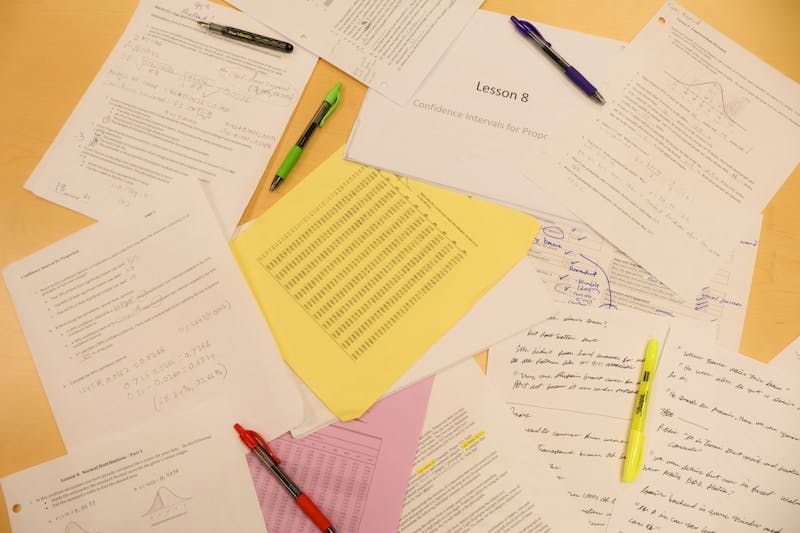Attending a university comes with highs and lows. College is a privilege; to be able to afford college and do well is difficult. Though college is both unaffordable for many and stressful beyond belief, it is very important to remember that with the opportunities we receive in college, our world is our oyster.
I have never felt that you could not make a living without college. I do not know many people in my family nor family friends who have gone to college. Many of them have made a good living without it, and some of them have not. I have always been grateful to my parents and grandparents for making me feel proud of the person I can be. Moreover, I celebrate any hard work that anybody puts in to reach their goals.
The fear of disappointment is major during higher education. Students feel the insatiable urge to satisfy everybody, oftentimes besides themselves, to ensure that others feel proud of them. Nevertheless, there will always be mistakes or lack of motivation. We cannot be perfect. During my college experience, I have noticed that there are people of authority who want what is best for us, and others that crave a “power high” of being in charge.
I am lucky to say that I have experienced professors who put my future in their best interest. I am a student journalist, and I have always seen the effort and ability my professors have to help me succeed. I am not coddled, but they provide me with benefitting exposure and harshness that will allow me to adapt to the real world once I am presented with an opportunity of work. I do not take criticism personally, and I understand that professors would not teach if they did not have an interest in the lives of their students.
With this being said, there are authoritative figures who crave the idea of having power over their students. It is no secret that because they have a high degree to their name, they feel that they can say and do what they want without repercussions. I find this disheartening, as most of the time their students are only doing the most that they can. There is always a reason behind the behavior of a student and a professor, and I think this needs to be looked at in closer detail.
Evidently, there are many mental and physical effects that can stem from attending college. Having a constantly changing schedule, feelings of anxiety and depression, unfamiliarity of a home base and being entirely independent can play a role in the actions of a college student. It is taxing to be on your own, and it takes effort to try hard for yourself. Some professors — even though they’ve been to college — do not understand the intensity of overload a student can feel. Due to this, they use imperfections against students.
I am the first person to say professors deserve to be praised for the work that they put in, the dedication they put into their teaching and the ability they have to educate young people. However, I do believe that because of these abilities, they are harder on the people they instruct. I am under the impression that when people come to college, they — or their family — are paying for their education. With these ideas considered, I feel that there are rules that need to be rethought.
The difference between respect and disrespect is clear. While in class, the consistent usage of cellphones, speaking while the professor is speaking and leaving the classroom for long periods of time is disrespectful. Nevertheless, there are scenarios where all could be justified. If students are paying to go to college, there should be no complications. If a student does not want to pay attention, there should be no offense taken. A professor’s job is to teach students who want to be there. Their job is not to confront those who will not pay attention.
Unless a student is noticeably disruptive, those with authority should not demand full attention. I live by the rule: “Don’t judge a book by its cover.” If there is a clear issue, it should be taken care of privately. When students are embarrassed, they will try to prove their behavior as correct regardless of accuracy. If a professor utters unnecessary comments toward their students, they are doing an injustice to the students’ futures. Nothing will make a person more unmotivated than their instructor treating them as unworthy. If a student needs a computer to complete their assignments or take notes, there should be no predicament with their ability to do the work they need to do.
College is a game of fair or unfair. This life is hard for everybody involved; it will never be easy. There will never be a solution where everybody is equally as motivated, stable or willing to put forth exemplary effort. Everybody has different priorities, and some of those priorities include the indication of holding students to a lower pedestal.
Every university should provide a safe, welcoming and inclusive environment to people who want a higher education. As I was growing up, I never saw myself going to college. With the help of professors, the institution and opportunities I was provided, I realized that life was about more than a “power high.”
Give power to those who want to learn. It should not be socially normal to treat younger — or older — people as inferior. Our powerful authority should be self-worth, and our “power high” should be inclusion of all. Without the acceptance of uncontrollable personalities, we cannot positively instruct. Power is a construct.


The Slate welcomes thoughtful discussion on all of our stories, but please keep comments civil and on-topic. Read our full guidelines here.